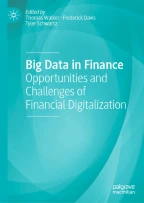
In the financial sector, the importance of big data in decision-making continues to increase. This growth is facilitated by ongoing improvements and refinements in artificial intelligence (AI), where model performance in prediction tasks has continued to improve with recent innovations such as deep learning. The ability for financial models to predict more accurately, in conjunction with big data, has led to many innovations in areas such as automated lending, portfolio construction and management (robo-advising), risk management, fraud detection, quantitative and high-frequency trading, as well as customer support. However, while AI-based analyses of big data have led to many positive developments in finance, critical questions remain, including how data is collected (consumer privacy and ethical concerns), stored (environmental impacts), secured, as well as analyzed and used. This edited book critically analyzes new developments at the intersection of big data and finance and provides different perspectives on their impact on the financial sector and the way it operates. This introductory chapter summarizes the use of big data in finance and provides an overview of the eleven contributions featured in the collection.
This is a preview of subscription content, log in via an institution to check access.
eBook EUR 85.59 Price includes VAT (France)
Softcover Book EUR 105.49 Price includes VAT (France)
Hardcover Book EUR 105.49 Price includes VAT (France)
Tax calculation will be finalised at checkout
Purchases are for personal use only